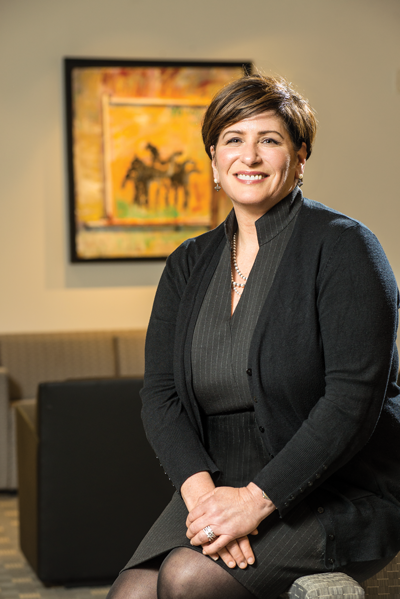Not ready for a merger? Law firm networks offer an expansion alternative

Hope Krebs. Photograph by David Fonda.
For law firms eager to gain geographic diversity, Hope Krebs suggests an approach she believes is far less risky than merging: a law firm network.
“With a global merger, there are so many hurdles you have to overcome in each jurisdiction,” says Krebs of Philadelphia, who co-chairs the international practice group at Duane Morris. “If you’re going to expend those resources, you’d better make sure you know what you’re getting. With a network, you know the quality of the lawyers. In a network, although resources are consumed, it’s nothing like a merger.”
Krebs serves as chair of Multilaw, a global network of independent law firms that links clients with attorneys internationally. Member firms pool resources and refer client matters, forming an alliance that serves as a distinct alternative to merging with a law firm in another country. Founded in 1990 and headquartered in London, Multilaw boasts 8,500 attorneys from 80-plus member firms in more than 150 cities. Eight U.S. firms make up Multilaw’s American contingent. “We’re friendly competitors,” Krebs says.
Due diligence and quality control mechanisms are the hallmark of Multilaw, according to Krebs. “This is not a Yellow Pages. These are trusted advisers who can service the needs of your clients in many countries,” she says. Multilaw firms undergo a rigorous recruiting and invitation process, resulting in a known legal quantity that surpasses what you might get by sending a random SOS for local counsel to lawyer friends, Krebs explains. “You’re not going to just get someone you met once at a conference. Our firms are the go-to firms in their jurisdictions. You’d be hard-pressed to find a better firm in their areas. Lawyers are also incredibly responsive to Multilaw clients. You get a certain level of attention and quality.”
Once members, firms are subjected to an “intense appraisal system.” Every three years, on a rolling basis, firms are re-evaluated “to make sure we’re all still in alignment because we’re only as strong as our weakest link.”
Member firms may turn to Multilaw colleagues for a discrete matter or for a full-blown request for proposal. Each member firm has a “contact partner,” who serves as a bridge into and out of that firm. As Duane Morris’ contact partner, Krebs receives inbound or outbound Multilaw requests by email or phone at least once a day, sometimes in the middle of the night.
Read more: How to pull off a successful law firm merger
A member firm may have its own international offices but still uses Multilaw “to complete the world,” Krebs notes. “Multilaw firms recognize that you can’t have an office everywhere.” At the time of the Journal’s interview with Krebs, Multilaw had a pending RFP that spanned 72 countries.
Once the relationship is established, the firm doing the work typically bills the other firm’s client directly. Not surprisingly, business development is another huge benefit of an international network. Krebs recounts a recent meeting between one of her Duane Morris partners and a potential client. The partner asked the general counsel what kept him up at night. The GC answered: “All the compliance work we have in the foreign countries where we have subsidiaries.” Krebs’ partner responded confidently: “I think we can help.” Not only did the firm get the client at least in part because of the Multilaw connection, but that engagement generated additional real estate and employment work for the sister Multilaw firms originally hired to do the compliance work.
Krebs is eager to dispel misconceptions about law firm networks. “It’s not just a bunch of little firms cobbled together,” she says. “It’s a strategic network. For my firm, it’s a way to complete our geographic footprint. It makes us bigger than the biggest with low risk.”



